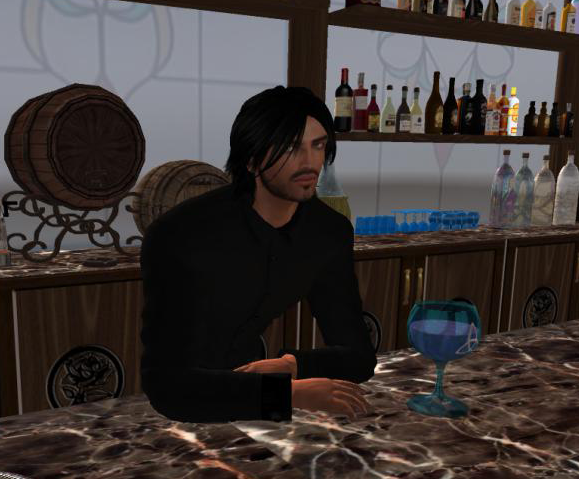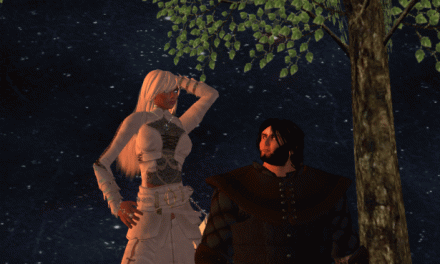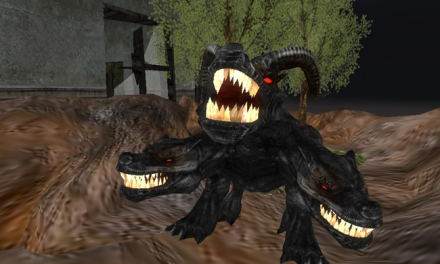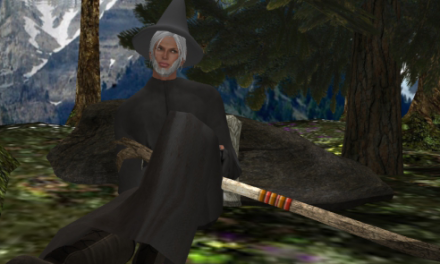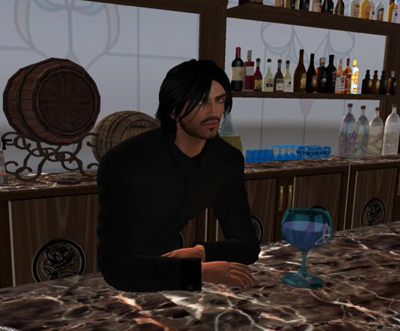 The Lay of the Lyrilim
The Lay of the Lyrilim
By
J.B. Toner
A neverending rainfall on a vast, dark lake. This droplet, that; a year ago, an aeon hence. The ripples cross and merge and dance together, interfering with the closer ones in ways that we can see—making patterns with the farther ones in ways beyond our sight. There is so much we think we know. But in the end, no single drop can be truly understood except by one who understands them all.
My name is Elladonna Mirielavay. Ella Fargazer, if you like. I live among the Elves, though not fully one of them. And I work among the Goblins and play among the Humans, though I share none of their blood at all. You, friend, I think, are mortal? Perhaps, then, you know the city of Boston. I was there on Christmas Eve, in a bar called Dill’s.
Such a place! A log from the Silver Tree was burning on the hearth: a leaping purple flame, warm and tireless, redolent of lilac and crisp green apples. Three Dwarvish sisters were playing jigs on fiddles strung with mithril—jigs so poignant, sweet, and merry that you could hardly dance for weeping nor weep for dancing. Mugs of Ogre ale, bowls of Pixie whiskey, horns of ancient mead, and steins of beer from someplace called Vermont, were raised in countless toasts, along with songs of fellowship and joy. Scores of folk swirled through that mystic tavern, yet by some trick of architecture, it never felt too crowded for heart’s ease.
“Lady Mirielavay!” called Dill, dark-bearded owner, from behind the bar. “Welcome back, and happy Yule to you.”
“And to you, good kinsman!” A fellow whom I knew of old—Bartholomew, rotund and jolly as the Claus himself—was leaping from his stool to dance as I approached. I kissed him on the cheek and took his seat, doffing my purple scarf. “A petal-wine of Windismere, I beg.”
“At once.” Dill moved with calm, broad-shouldered grace to pour my drink.
“Pardon.” Two seats down, a short but hulking fellow with a low-brimmed fedora. As he turned in my direction, I saw wide unblinking eyes and curving tusks. Dill’s was open to all folk, but I was still surprised to see a goblin here tonight. They keep their own holidays. “Goblin McGreth. Elf Mirielavay?”
“Often,” I replied, with wary joviality. “Have we met, sir?”
“Shot you. Three weeks back.”
I caught a rising smile and kept my aspect neutral. “You mistake me, I think. We of elvenkind are slow to die, but not against the venom of a goblin arrowhead.”
“Your face. I know.”
A palm landed heavily on the bartop. “This guy botherin’ you, Miss Ella?”
This time the smile broke through. “Mr. Jones! You’re well, I hope?”
“Yeah, can’t complain, you know, made it through another year. Assuming no one whacks me in the next few days.” Violence Jones, the bouncer. A full-blood human who somehow made his home amongst the mystics.
“I’m glad of it. I haven’t seen you since—well, since you shot me.”
“Aw, come on, I said I was sorry.”
“You didn’t, actually.”
“Well, I meant to.”
“Again, pardon.” McGreth had left his stool and was standing behind me—not close enough to menace, but close enough to encroach. “No umbrage meant. You are a spy, however?”
“Arright, Gretsky.” Jones was reaching into his vest for what was no doubt a weapon as deadly as any goblin bow when Dill returned. Laying a hand on Jones’ shoulder and a goblet on the bar, he spoke in a quiet voice that carried nonetheless above the din.
“Friends, this night is one of peace. Your wine, my Lady. And friend McGreth—another pint of frozen smoke? On the house.”
He shook his head. “No trouble wanted. But.” And he bowed in my direction, slightly. “A friendly challenge.”
“Oh?” My brows went up. “Intriguing, sir. The stakes?”
“Answers. For me—how you still live. For you—well.” More teeth emerged. “You left our lands. Without what you sought.”
“Hm.” Three weeks ago, I had indeed been shot: a poisoned shaft, keenly aimed through snow-laden boughs from a shadowed parapet. I’d been seeking information about a mysterious edifice peeping above the mountaintops; but as McGreth observed, the sentry’s alarum had forced me to withdraw without that knowledge. “And the game?”
“Hyperion.”
Even the stoic Dill looked surprised.
“. . .I can hardly refuse, Goblin McGreth.” I picked up my goblet. “Shall we find a booth?”
He nodded, and I rose.
Only one door leads into Dill’s tavern, and the single window next to it is usually curtained. Folk come here to forget the world outside. As you enter, you’ll see a large common area with the bar itself at the far end. On your right is the fireplace, and two inconspicuous doors leading to the chamber pots. On your left are a half dozen booths where you can roister with your friends or draw more curtains for privacy. Most of the patrons were up and dancing at that moment, so McGreth and I pushed our way into an empty booth and pulled the veil.
“How nice,” I remarked. “Dill provides both paper and pen.”
“He is wise.”
Hyperion is a riddle game we play in the mystic realms. Each player brings a question to the table. The first player writes two lines setting forth their question, and the second responds in two lines, giving a clue; then the first player writes two more lines to clarify, and the other responds once again. Then the two players trade roles. Of course, it hinges on the integrity of the contestants, who could easily lie or obfuscate—but goblins, though savage in battle, have a rigid code of honor.
As the challenged party, I was the first player. I lifted my pen. Sipped my wine. Closed my eyes in deepest rumination. At last, I opened them and scribbled,
In wintry grandeur grim it stands
Within a land of glinting spears;
We like to make things difficult, you see. By the end of the game, the two opponents have co-written two full verses in the demanding Hyperion form. Every other syllable must rhyme, thus: uAuBuAuB, with the second line ending in a C which repeats throughout. For the next two lines, a new rhyme begins: uDuEuDuE, with the fourth line once more ending in C. Goblin McGreth considered for a long moment, then replied:
’Twill soar beyond Earth’s hoary bonds
And o’er the comets’ gloried spheres.
Frowning, I took a deeper draught of petal-wine. A tower to the skies! It didn’t end well when mortals made the attempt. (No offense meant, friend.) But to what purpose? Some manner of astrological sorcery? I raised my pen.
The yawning doors of dawn shall pour
Upon us lore beyond the years:
As you see, the second half of the verse reverses the original rhyme scheme: uEuDuEuD, still keeping the final C. McGreth’s task was now to elucidate upon my unspoken “such as,” while completing the mirrored form with a pattern of uBuAuBuA. For a few moments he chewed on his pen. Then, rapidly, he wrote:
We’ll stand as kin with phantoms dim—
Abandon limits, damn all fears!
There was silence. I understood, and it surpassed my dreads. The goblins were raising a tower to heaven in order to confer with the spirits of air—but not the good ones.
“Elf Mirielavay.”
“Hm? Oh! Yes, of course. Apologies. Your move, sir.”
He began the second verse: his own query to me. He wrote swiftly, as if he had been composing this couplet for some time, and it suddenly occurred to me to wonder how in all the Seven Hells he had found me here. If he were wicked at heart, the Cherubim who guard the Gates would not have let him pass from the mystic to the mortal realm. Was it conceivable that he had simply come here for merriment, and recognized me by chance? Was it the hand of the Mightiness at work, or that of some darker force?
Through sleet and snow I fleetly flow,
My feet unslowed by lethal dart;
And here is the truth: I am not an elf. Nor am I a mortal or a goblin or an angel. I am the offspring of elf and angel, known as the Lyrilim, bound to the terrestrial planes but invulnerable to corporeal harm.
I may thus laugh at slaying shafts—
My greyer half, a Fae-blood heart.
He mouthed the phrase, “my greyer half,” and then he nodded. I think he had suspected all along.
What crafty ways, to graft the Blaze
To chaff, and raise my dafter part!
And at that, I felt my smile return. His words bespoke an insult, yet his face was kind (for goblinkind). I had the strangest sense that he was merely teasing me. And it struck me that the Hyperion is an Elvish game, ill-suited to the terse and tight-lipped idiom of goblin folk; moreover, that the secret of my survival was a far smaller piece of intelligence than the mystery of the tower. Perhaps McGreth had found me by mistake, and seen a chance to call for help? Perhaps one honorable enemy objected to the foul stratagems adopted by his superiors? After brief deliberation, I replied:
And so, we meet as foes; but sweet
Repose will treat our woes with stars.
He gave a wry grimace. “Reconciled in death? Perhaps not. You will still be with angels. We with devils.” Then he gestured to the first paper we had written on. “If you please.”
“Indeed.” I wrote at the top, “The Tale of the Tower.” Put the page in the ashtray, struck a match, and burned it.
McGreth in turn took the second page and wrote, “The Lay of the Lyrilim.” And he too set it fire.
Then he rose, covered his fist with his palm, and bowed. “Farewell.”
“Happy Yule to you, Goblin McGreth.”
Once he had gone, I paced to the bar and sat. Around me surged the music and the revels. I wished I could find the heart to dance.
“A good game?” Dill asked quietly.
“Informative.” I glanced up. “Goodman Jones.”
“What can I do for you, Miss Ella?”
“Pray, what is your tipple of preference when you see hard times ahead?”
“Bourbon,” he said instantly.
“Barkeep—bourbon, please.” I placed a silver coin on the countertop.
With no further word, Dill took a bottle from the topmost shelf and filled a small glass with it, neat. I drank it down.
“Gentlemen.”
We three bowed to one another, and I took my leave. I had come to Boston meaning to stay till the New Year, but things had changed abruptly.
A few snowflakes drifted in the bitter air. I moved with rapid stride through the cold, dark streets, tasting the sting of frost. Not far from Dill’s, a narrow alley led between two tenements. I turned and trod the city’s windblown detritus to a dumpster in the middle of the alleyway. There stood a derelict in rat-chewed clothes, his beard the color of dust. He gazed into some inscrutable distance, but his eyes focused on me as I drew near.
“Peace be to you,” said he.
“And to your spirit, good Keeper. May I pass?”
“Pass, Elladonna Mirielavay.”
The universe burst and swirled about me. Blown, bodiless, upon the wind between the worlds, I surrendered myself to the vast riddle of Creation. For timeless moments I felt the mighty dance of souls, all intertwined, all wheeling through unthinkable gulfs of destiny. The choices of the first man changing the options of the last—the meditations of the last man affecting the magics available to the first. All time, all space, all spirits, in a writhe and seethe of love, indifference, murder.
Then the bite of chill. I opened my eyes, inhaled, and returned to myself. I was back in the Mystic Realms. Overhead, the star-shot radiance of the Aurora Borealis. Distant, the howl of wolves. And all around me, the snowy steppes of the North.
I had to get my information to the High Council as soon as could be. My elven blood gives me great speed; my angel blood, endless stamina. I launched myself into a sprint, heading East, and the lonely pines went flashing by as the miles rolled away.
But as I ran, I ruminated. And before long, a better plan came into my head full-formed. The Council was many leagues hence; far closer lay the domain of the Khazilim.
Like myself, the Red One is half-angel: his other half, dwarvish. You know him as Santa Claus. And upon the Yuletide midnight, he does indeed undertake a labor of incredible power and sacrifice—that much, your traditions have gotten right. But he does not travel your globe putting presents under trees. His work is of a different kind.
If I could reach him with this news, I thought, he could inform the Council at once with his own strange arts. And, further, he could no doubt take immediate action. I myself am a paltry half century in age, but the Claus is countless years old, and holds tremendous wisdom and power. He would know what to do. But the Houses of the Helpers stood upon a titanic plateau, surrounded by a chasm as deep as the ultimate fires. They were impassable, unless one rode upon a flying reindeer.
Or a Dragon.
Not far to the South, I knew, was the lair of a worm named Kraaaaaa. She bore me no love, for I had once stolen from her; but I had no other chance of reaching the Claus before midnight. I turned my footsteps South, and came swiftly to the mouth of a cavern rimmed with ice. Immortal wine-flowers blossomed on both sides of the entrance—but the path leading out was barren.
I stopped at the threshold. “Kraaaaaa!”
Silence.
“Kraaaaaa! You know me, good dragoness. It is I, Mirielavay.”
And a deep, subliminal rumble in the stone. Far down in the shadows of the catacombs, a small red flicker.
“You count me no friend, I know. But I need your aid.”
The rumble grew. A resonating growl, as if a mountain spoke: “Mirielavay.”
“Hello again.”
The red light grew. I heard the scrape of scales on bedrock. “You. You laid hands upon my hoard, elf-witch.”
“I did. And I sorrow for my deed. But you remember that the necklace was returned intact? And moreover, I paid the Flame Tribute.”
“Foreign fingers on my treasure.”
“Yes. Again, I offer contrition. I was young and foolish then.”
“That was six months ago.”
“I’ve learned much, noble Kraaaaaa, since then. I’ve learned, among other things, that the Goblins are building a tower to the sky. They seek to make pacts with the Demons.”
“. . .Ill tidings. But why come to me?”
“I must reach the Red One’s demesnes before midnight. He must know of this before he goes to his labors.”
A scarlet flare in the darkness. “You wish to ride upon my back?! I should drop you into the chasms.”
“Agreed. But Kraaaaaa, you mustn’t. A war is coming that will twist the Realms and shake the vaults of Heaven. Elves and Dwarves and Dragons must now fight side by side. No other chance remains—for our freedom, our survival. Truly, truly I regret my misdeeds, and I pledge any boon you may ask. But please, we’re out of time. We must reach Santa Claus.”
The billowing flame came closer, closer. In the dim light I saw her huge green head, her iridescent eyes. Smoke plumed up like chimney fumes from the corners of her great fanged maw. And behind her long serpentine neck, the wings like mainsails flexed and fluttered.
“A boon, you say.”
“Any you shall desire. In truth, it’s the least I can do. My friend Vissarion warned me that working for the Council might force me to grow up.”
“You’ve been spying in the goblin lands?”
I nodded.
“A tower to the sky.”
Another nod.
“If they succeed—”
A wolven howl, far off.
“Climb on my back, Mirielavay. Strange times are these, strange times.”
I sprang upon her noble, arching back. Her wings spread wide, she spouted fire, and we swooped into the everlasting skies.
J.B. Toner studied Literature at Thomas More College and holds a black belt in Ohana Kilohana Kenpo-Jujitsu. He currently works as a groundskeeper in New Hampshire, and he and his lovely wife just had their first daughter, Sonya Magdalena Rose. Toner blogs at jbtoner.blogspot.com and tweets at AntiheroCouplet@twitter.com.”
